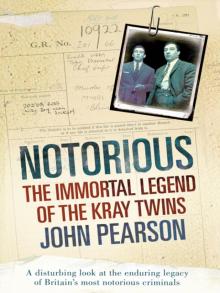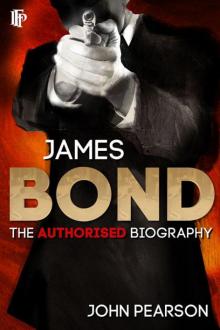- Home
- John Pearson
Biggles Page 5
Biggles Read online
Page 5
Biggles was irrepressible, and twenty minutes later he was giving the F.E.2 full throttle, and the sheds and hangars of the Squadron H.Q. were receding in the rain beneath them. It was filthy weather all the way — rain, broken cloud, and at 8,000 feet ice was soon forming in the cockpit (twice Way fired short bursts on his Lewis guns to stop them icing up). In some ways, however, the weather was a blessing. The cloud gave cover and it would be a very eager German who took his aircraft up in such conditions. And in fact, some forty minutes after taking off, Biggles and Way had reached their destination without incident.
Then came the tricky bit. Biggles had difficulty finding a break in the cloud and had to bring the aircraft down to 2,000 feet before he and Way could see a thing below then, and at that height the eighty-mile-an-hour F.E.2 was something of a sitting duck for the German anti-aircraft guns. Not that this made the slightest difference to our hero. One of the earliest lessons he had learned was that the only way to deal with ‘Archie’ was to ignore it. ‘If a shell has your name on it, too bad,’ was his philosophy. But as the aircraft sailed slap through the middle of the German barrage, even his equanimity was shaken, and the aircraft bucked and bucketed as the German gunners got rather too close for comfort. Biggles took what evasive action he could manage, banking the F.E.2 and doing his best to twist and turn across the target — none of which made his observer’s task any easier. But Way was meticulous, and as the lumbering aircraft flew across Vanfleur at little more than 1,000 feet, he had a great deal to record. The sidings of the goods yard were full of flat trucks, each with a German field gun plainly visible. Shell were being loaded further on, and there were stores and motor vehicles, whilst outside the little town were row on row of tents for troops that would reinforce the big attack.
In those days before aerial photography much depended on the accuracy of the observer, and it was clearly urgent to get detailed news of this big German build-up back to the Allied High Command. So whilst Biggles’ instincts were to get out of Vanfleur now as speedily as possible (and how he wished he’d had a bomb or two to drop on the ammunition dump outside the station), Way was insisting on a further flight across the town just to make sure that he had everything recorded on his note-pad. Biggles reluctantly agreed and, bringing the aircraft almost down to rooftop level now, started the return journey over the town.
This time all hell broke loose, not only from aircraft guns, but also from German soldiers in the streets, who took pot shots with their rifles at the aircraft with the unmistakeable red, white and blue roundels on its wings. Miraculously, she came through unscathed — apart from some tell-tale bullet-holes around the cockpit, and shrapnel gashes in the wings — and Biggles decided they had tempted providence enough for one wet afternoon and that it was time for home.
Easier said than done. As he began to put the aircraft into a slow climb and turn her nose south-west, the German guns below fell silent, and suddenly he saw the reason. Out in the clearing sky that lay between the F.E.2 and home were twelve black dots which, even as they watched, grew larger. German Albatrosses! Against such opposition Biggles’ F.E.2 had as much chance of surviving as a cow faced with a pack of hungry lions.
But he still possessed one lingering advantage — the blanket of low grey cloud that stretched north of Vanfleur to the Belgian coast. If they could reach it, there was still a chance of giving the faster German planes the slip.
For the next few minutes it was touch and go, with Biggles speeding for the cloud-bank at full throttle, and the German triplanes closing in. Biggles could see by now the Squadron numbers on the fuselage of the leading aircraft, and then, suddenly, they were in the cloud. It was like flying straight into a dense grey fog, an eerie, silent world in which the German planes could never hope to find them.
There was no question now of flying south towards St Omer, for their best hope of dodging their pursuers still lay in the protection of this interminable bank of cloud. So, Biggles flew north-west by his compass, hoping in the end to reach the Belgian coast, then follow it down towards Dunkirk and home.
At first it seemed as if this plan would work. The German aircraft had no hope of finding them, and after studying his map and calculating distance from his flying time, Biggles decided they would soon be over the Belgian coast, and cautiously brought the aircraft down below the level of the cloud.
‘Great!’ shouted Way as they reached clear air beneath the cloud-bank, for there on the horizon lay the sea with a pale blue sky beyond. Biggles gently eased the aircraft to the left and started the slow journey back to Base. Two things were worrying him by now. The first was his petrol level. The F.E.2’s maximum endurance was three hours, and they had already been airborne more than half of this. The second worry was an enemy patrol. In this clear sky by the coast the F.E.2 would have no hiding place.
For twenty minutes all seemed well. The pale blue winter sky began to darken with the approach of evening, and Biggles kept the aircraft’s nose along the white line of the breaking surf beneath, whilst Way kept a sharp lookout for an enemy. But as always happens, trouble came when least expected.
From the map, Biggles had calculated that they would soon have reached the point where the Front Line met the sea, and was already looking forward to getting back in time for dinner, when Lieutenant Way shouted out a warning and swung his Lewis gun towards the water. Biggles followed the direction, only to see the dark shape of an Albatross heading towards them from the mist. At the same time, something made him glance in the opposite direction: another Albatross was swooping towards them for the kill. The two scout planes, out on their evening patrol, were evidently working together and launching a beautifully-timed dual attack on them.
Way did his best to head them off by firing manfully at each aircraft, but the odds were obviously too great, and the F.E.2 was no match for the synchronised machine-guns of the German planes. The distances began to narrow, and above the racket of the engine and the Lewis gun. Biggles could hear the whine of the two approaching Albatrosses. They were daring fliers to approach so close, and at the point where it looked as if collision was inevitable, Biggles yanked at the joystick and sent his aircraft zooming upwards. A second later came an appalling crash from just below. The aircraft shuddered in the explosion and was hit by small bits of wreckage, and as Biggles peered down he saw what had occurred. The two German pilots must have taken simultaneous evasive action to avoid collison, but had done it in the same direction and had met each other head on. There were no survivors, and as the F.E.2 lumbered on unharmed, Biggles could tell himself that he and Way had just had one of the luckiest escapes of the war.
But talk of escape was slightly premature. St Omer was still a good half hour away, the light was failing and suddenly the engine faltered, coughed, and then cut out. Biggles held the aircraft steady as it started to plane down towards the sea, and for a while he thought that he would even make the beach. No such luck. Like an extremely tired seabird the old F.E.2 glided towards the waves, bounced on the water and then subsided in a shower of spray. Luckily the sea was very shallow, and Biggles and Way, their flying jackets jettisoned already, were able to wade ashore unhurt and make their way towards the sand dunes up beyond the beach.
It was as well they did, for at this point they had no idea on which side of the Front Line they had landed, but they soon found out when they heard German voices echoing along the beach. An enemy patrol had ventured out to investigate the crashed British aircraft. Luckily the light was fading quickly by now and the Germans were delayed by their attempts to search the plane. During this time the two British airmen made good their escape along the dunes, dodging between the shadows and the banks of high sea-grass that gave them perfect cover.
Soon they were halted by barbed wire, and as they lay hidden, trying to make out just what lay ahead, they heard a German working party digging a few hundred yards ahead. There was no longer any doubt of their position. They had reached the Front Line — and were lying on the German
side of it.
Both men were wet and very cold — conditions not exactly calculated to bring out the best in Biggles — and it was Way who then decisively took charge.
‘Nothing for it, I’m afraid,’ he whispered. ‘Either we swim, or spend the remainder of the war in a German prison camp.’
Swimming had never been much of a speciality with Biggles. To tell the truth, he loathed the water and it required the grim alternative of prison even now to make him think of it. Fortunately Way was a powerful swimmer — ‘Hang on to my collar,’ he told Biggles as they slid into the icy waves.
The swim appeared to last for ever, and but for Way, Biggles would undoubtedly have drowned. Luckily the Lines were fairly close together, and the current flowed towards the south. After what seemed a wet eternity, Way turned towards the shore, and Biggles felt the sand again beneath his feet.
They scrambled up the shore and then a voice rang out — ‘Halte-là!’ It was a French patrol and they were safe at last.
It took another hour and a half to get back to the Mess at St Omer by road, and when they arrived, in borrowed French uniforms, they were something of a sight. But they received a hero’s welcome, and that very night Way’s information from Vanfleur was en route to the generals — who, for once, made good use of it.
Adventures such as these appealed to Biggles, for his attitude to war remained a very private one. Apart from his passion for flying, which nothing could deflate, he still regarded the war as something of a personal crusade. But during the early spring of 1917, the war in the air began to change, particularly for hard-pressed 169, and Biggles started to become uneasy about what was happening. As he put it when he talked about it later, ‘All the fun suddenly went out of it and it became a very beastly business — like the war itself.’
Part of the trouble was the growing strength of the German opposition, which, with faster planes, and sound Teutonic tactics, was sending out massed patrols against which the isolated F.E.2s had little chance. In answer to this the Allied Air Command switched 169 to night-bombing duties — a task which hardly suited Biggles. It was hazardous, impersonal work, and although he continued to fly with Lieutenant Way, and on one memorable April night joined in a mass attack on the Richthofen headquarters at Douai, Biggles did not enjoy it, and made no secret of the fact.
He was at his best when faced with an instant challenge, and was still very much the boy who had taught himself to survive in the forests of Garhwal. Although relations between Biggles and Major Paynter were as bad as ever, the C.O. must have recognised something unusual in him, since it was now that he chose him for a very special mission, which required rather more than the everyday pilot’s skills. Biggles was still barely eighteen at the time, but this mission was to prove of key importance to him, both as a foretaste of the sort of high adventure he would follow in his life, and for the introduction that it gave him to the man who would help to shape his destiny. This was a tall, emaciated-looking, steely-eyed Intelligence major attached to Wing Headquarters. His name was Raymond.
Paynter introduced him to Biggles in his office, and Major Raymond, in that clipped, laconic way he had, explained that the Allied Secret Service had a little problem. The German army was bringing up reinforcements over a bridge across the River Aisne near a town called Aille. Several air attempts to bomb the bridge had failed, and because of the urgency it had been decided to try sabotage. Raymond had found a Frenchman from the district who was highly recommended by the French High Command as one of their top saboteurs, but he had to be landed near the bridge — by night, of course, and without arousing the German guards. The F.E.2s were ideal for this sort of work — they were slow and could practically land and take off in a cabbage patch. How, Major Rayond asked, did Biggles feel about it?
‘No problem, sir!’ said Biggles easily.
‘Oh, and there’s just one other thing I should have mentioned,’ added Raymond. ‘Under the rules of war, if they catch you or the Frenchman they’re perfectly entitled to shoot you both. They probably will. Say if you’d rather back out now.’
Biggles shook his head.
‘Capital,’ said Raymond. ‘Say nothing of this to anyone of course, but be prepared to leave at a moment’s notice’.
It was next day, just as Biggles was finishing dinner in the Mess, that he was called again to Paynter’s office, and Major Raymond introduced him to a small round Frenchman wearing a bowler hat.
‘Here’s your passenger,’ he said. ‘Take-off in half an hour’s time. Good luck!’
It was so casual that the Frenchman might have been a civil servant who required flying back to Base. He spoke little English and seemed a most unlikely saboteur. They discussed their mission briefly; despite his broken English the little man appeared extremely competent, and had a brief-case with him. ‘Dynamite,’ he said cryptically when Biggles stared at it.
‘How is he planning to return?’ Biggles asked Major Raymond.
‘Oh, that’s his business,’ he replied. ‘He has his own ways of getting back across the Lines.’
‘Why don’t I wait for him?’ said Biggles.
‘Far too dangerous. They’d be bound to spot you.’
Biggles accepted this, but was worried at the thought of this fat, heroic little Frenchman — who rather reminded him of his old friend Captain Lovell — having to risk the guns and wire of no man’s land.
‘Tell him I’ll return for him at dawn,’ he said. ‘We’ll make a rendezvous and I’ll be there.’
‘On your head be it if you want to take the risk,’ said Major Raymond.
It was a tricky piece of flying, for plainly there was no room for error, but luckily Biggles had already had a chance to reconnoitre the bridge in daylight earlier that morning, and to memorise the landmarks and the field near the river where he had to land. Luckily there was a moon — and Biggles had a knack for this sort of precision flying.
He gave the thumbs up to the Frenchman — and the Frenchman, from his seat in the front cockpit, solemnly raised his bowler hat.
The flight took less than half an hour, and Biggles was relieved that the German anti-aircraft guns took no notice of this solitary aircraft crossing the Lines at 5,000 feet. But he was taking no chances. He could not risk alerting the German guards on the bridge, and before he reached the long pale ribbon of the Aisne, he cut his engine and came in to land in a slow and silent glide.
It was the sort of landing every pilot dreads. Biggles had no way of knowing if there were trip wires stretched across the field, or if a German ambush was already waiting for them. But they were lucky, and the bus-like F.E.2 made a perfect three-point landing.
‘Six a.m. sharp, I’ll be there,’ whispered Biggles as the Frenchman, with considerable agility, heaved himself and his black bag over the side of the cockpit and landed on the grass.
‘D’accord,’ he answered. Biggles watched the bowler hat go bobbing off across the field, and waited nervously until the Frenchman reached the shelter of the hedge before starting up the engine. There was a row of trees at the far end of the field, and the wheels of the F.E.2 scraped through them as it took off in the darkness, turned and sped for home. This time there was some anti-aircraft fire and Biggles wondered if the Germans had been put on the alert for him.
He had five hours to wait before returning, and it says much for the state of Biggles’ eighteen-year-old nerves that within ten minutes of landing back at base, he was rolled up in his bunk and instantly asleep. The next he knew, his batman, holding a cup of tea, was shaking him on the shoulder and saying sternly, ‘Five o’clock, sir. Time to rise and shine!’
It was a cold and cheerless morning, and Biggles began to wish that he had taken Major Raymond’s advice and let the Frenchman find his own way back. But a promise was a promise, even if it meant rising at that unearthly hour. His aircraft was refuelled and waiting, and soon he was across the Lines and heading for the Aisne as dawn was breaking. He followed his earlier routine, cutting his eng
ine and gliding in towards the field, and then glanced at his watch. Six o’clock exactly. ‘How’s that for timing!’ he thought to himself.
Already there was sufficient light for Biggles to survey the landscape, and as he did so something caught his eye — a movement in a nearby field. He looked again and suddenly made out, in the shadow of a line of trees, a row of horsemen — German cavalry. By now he was approaching the rendezvous, and was just about to switch on his engine and escape from what was obviously a trap, when something else caught his eye — a figure in the middle of the field, waving at him. His man was obviously there and waiting for him to take him off to safety. At whatever risk, he felt he had to land and pick him up.
He took a swift glance at the German cavalry in the nearby field. They had spotted him, and were already galloping to where he aimed to land, but the figure in the field was still waving at him.
‘Can’t let the fellow down,’ thought Biggles to himself. ‘He’d never trust an Englishman again.’ He pushed the joystick forward, started the engine to be ready for an instant take-off once the Frenchman was aboard, and aimed for the centre of the field.
But as he swept in to land, a strange thing happened. A second figure darted from the edge of the field and sprinted towards the waving man. Biggles could see he had a gun. There was a flash, the first man fell and as the aircraft rumbled to a halt Biggles could see the man who had fired more plainly. He wore a large black bowler hat.
‘Bonjour monsieur,’ the Frenchman shouted cheerfully. ‘Like all you English, you are only just in time.’
‘But who’s the man you shot?’ shouted Biggles above the roar of his engine.
‘A German agent. They must have known you were coming and he was trying to decoy you down.’ The Frenchman heaved himself aboard as Biggles opened up the throttle. ‘Off we go, mon vieux, unless you wish to end up at the wrong end of a German firing squad.’

 The Bellamy Saga
The Bellamy Saga Notorious: The Immortal Legend of the Kray Twins
Notorious: The Immortal Legend of the Kray Twins Learn Me Good
Learn Me Good James Bond: The Authorised Biography
James Bond: The Authorised Biography Painfully Rich
Painfully Rich The Profession of Violence
The Profession of Violence Biggles
Biggles Blood Royal: The Story of the Spencers and the Royals
Blood Royal: The Story of the Spencers and the Royals